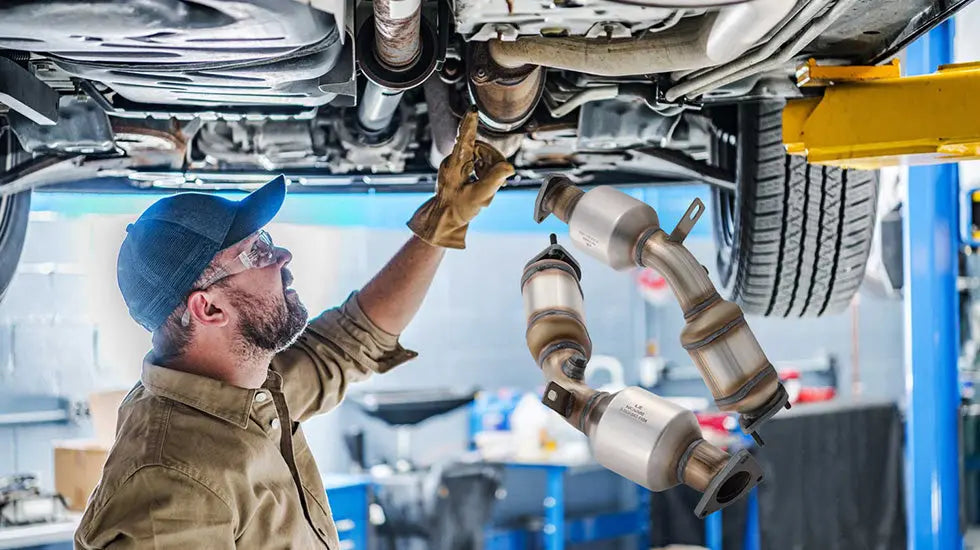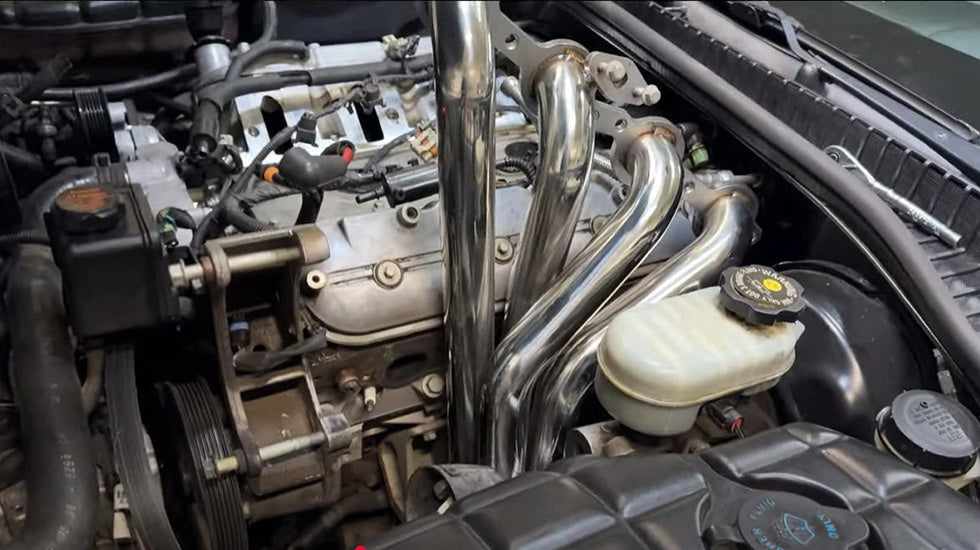The catalytic converter is a critical component of your vehicle's exhaust system. Its primary role is to reduce harmful emissions by converting toxic gases like carbon monoxide, hydrocarbons, and nitrogen oxides into less harmful substances before they exit through the exhaust pipe. This process helps your vehicle meet environmental standards and ensures that your car runs efficiently.
A functioning catalytic converter is essential not just for reducing emissions but also for maintaining the performance of your engine. When it malfunctions, it can lead to significant vehicle issues, including poor fuel efficiency, engine performance drops, and increased emissions. Understanding how to identify a faulty catalytic converter is crucial for preventing expensive repairs down the road.

Common Symptoms of a Bad Catalytic Converter
When your catalytic converter is malfunctioning, there are several telltale signs you can look for. The symptoms may not always be immediately obvious, but over time, you might notice the following:
1. Reduced Engine Performance
A major symptom of a bad catalytic converter is a noticeable decrease in engine performance. If you find that your car is struggling to accelerate, particularly on highways, it could be a sign that the catalytic converter is clogged. A blocked converter restricts exhaust flow, which can cause back pressure in the engine and hinder its ability to perform optimally.
2. Decreased Fuel Efficiency
A faulty catalytic converter can lead to poor fuel economy. Because the engine struggles to breathe efficiently, it requires more fuel to produce the same amount of power. This can significantly increase your gas consumption, causing frustration at the pump and affecting your overall driving costs.
3. Unusual Exhaust Noises
Another sign of a bad catalytic converter is an abnormal noise coming from your exhaust system. If you hear a loud rattling or tapping sound when the engine is running, it may be due to a broken or damaged catalyst. This sound is often caused by the catalyst material inside the converter breaking apart, which can block the exhaust flow.
4. Engine Misfires and Stalling
A clogged catalytic converter can cause engine misfires or stalling. This happens because the converter restricts the flow of exhaust gases, which prevents the engine from functioning smoothly. If your car stalls while driving or idles rough, it’s worth considering the condition of your catalytic converter.
5. Check Engine Light
If the check engine light turns on, it may be due to a malfunctioning catalytic converter. In most cases, your vehicle’s onboard diagnostics (OBD-II) system will trigger this warning if it detects high emissions or poor engine performance, which are commonly associated with catalytic converter failure.
How to Diagnose a Faulty Catalytic Converter
Diagnosing a bad catalytic converter isn't always straightforward, but with the right tools and knowledge, you can perform a few simple tests.
Using an OBD-II Scanner
One of the most effective ways to identify a bad catalytic converter is by scanning your car’s diagnostic trouble codes using an OBD-II scanner. If the converter is faulty, the system may register codes like P0420 (catalytic converter efficiency below threshold). This code indicates that the converter is no longer functioning at its optimal capacity.
Temperature Test
Another method to diagnose a clogged catalytic converter is to check the temperature difference before and after the converter. A functioning catalytic converter should allow exhaust gases to flow through it with minimal resistance. By measuring the temperature with an infrared thermometer, you can assess whether the converter is overheating due to a blockage. A significant temperature difference between the input and output can indicate a clog.
Rattling Sound Test
If you suspect your catalytic converter is damaged internally, a simple sound test may help confirm your suspicions. When the vehicle is idling, gently tap the catalytic converter with a rubber mallet (be careful not to damage it further). If you hear a rattling noise, this could mean that the internal catalyst material has broken loose, which can block the exhaust flow and reduce performance.
Exhaust Flow Check
Another way to test for a faulty catalytic converter is to check the exhaust flow. If you notice a significant decrease in exhaust pressure or the vehicle starts to lose power when accelerating, this could be a sign that the exhaust gases are unable to exit freely, indicating a possible blockage in the converter.
How a Clogged Catalytic Converter Affects Vehicle Performance
A clogged catalytic converter directly impacts your vehicle’s engine performance. When the exhaust gases are unable to flow freely, back pressure builds up in the engine. This can cause a range of issues, including:
-
Reduced Power Output: The engine may not produce as much power because the exhaust is restricted. This can cause noticeable sluggishness during acceleration or difficulty maintaining speed.
-
Engine Overheating: In extreme cases, a clogged catalytic converter can lead to engine overheating. The excess pressure can cause the engine to work harder than necessary, leading to increased wear and potential engine damage.
-
Increased Emissions: As the catalytic converter fails to do its job, your vehicle may produce higher levels of harmful pollutants. This not only harms the environment but could cause your car to fail emissions tests, making it illegal to drive in some regions.
Possible Causes of Catalytic Converter Failure
There are several reasons why your catalytic converter might fail, and understanding these can help you prevent future issues.
1. Overheating
Catalytic converters are susceptible to overheating, especially if the engine is running too rich (i.e., burning too much fuel). This can cause the precious metals inside the converter to melt or become damaged. Overheating can also occur if the engine misfires, causing unburned fuel to enter the exhaust system and ignite.
2. Physical Damage
Rough driving conditions, such as hitting a pothole or driving over large debris, can cause physical damage to the converter. Internal components can break loose, which may result in a rattling sound or clog the exhaust flow.
3. Poor Maintenance
Neglecting regular vehicle maintenance, such as changing the air and fuel filters, can lead to problems with the catalytic converter. For instance, if the engine runs inefficiently or emits excessive pollutants, it can cause premature failure of the converter.
4. Faulty Oxygen Sensors
Oxygen sensors monitor the levels of oxygen in the exhaust gases and help the engine control module adjust the fuel mixture. If an oxygen sensor fails, it can send incorrect signals to the engine, leading to an improper air-fuel ratio and ultimately damaging the catalytic converter.
How to Fix or Replace a Faulty Catalytic Converter
If your catalytic converter is faulty, the most effective solution is to replace it. Replacing a catalytic converter typically requires professional help due to the complexity of the procedure. It involves removing the damaged converter and installing a new one, which is best done by a qualified mechanic.
You can choose between aftermarket converters, which are generally more affordable but may vary in quality, or OEM (Original Equipment Manufacturer) parts, which are pricier but offer guaranteed compatibility and reliability. While some DIY enthusiasts may attempt the replacement themselves, it's often recommended to have a professional handle the installation, as it requires specific tools and expertise.
The cost of replacing a catalytic converter can vary significantly depending on the vehicle make and model, with prices typically ranging from $1,000 to $2,500 for parts and labor. However, if you're looking for a more affordable solution without compromising on quality, Flashark offers high-performance catalytic converters at a fraction of the cost, priced between $100 and $300.
When to Seek Professional Help
While some minor issues with the catalytic converter, like a loose heat shield or a clogged converter, might be fixable at home, it's best to seek professional help for more serious problems. If you're unsure about the symptoms or lack the tools to perform a proper diagnosis, a mechanic with expertise in exhaust systems will be able to identify the problem and recommend the best solution.
If you notice any of the symptoms mentioned above, or if your OBD-II scanner displays relevant error codes, don’t delay getting the vehicle checked. Ignoring the issue can lead to more severe engine problems and costly repairs down the road.






